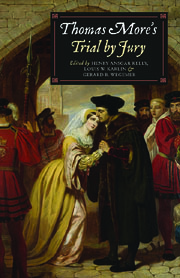Book contents
- Frontmatter
- Contents
- List of Contributors
- Preface
- Abbreviations
- Chronology
- 1 A Procedural Review of Thomas More's Trial
- 2 Natural Law and the Trial of Thomas More
- 3 A Guide to Thomas More's Trial for Modern Lawyers
- 4 Thomas More's Three Prison Letters Reporting on His Interrogations
- 5 Judicial Commentary on Thomas More's Trial
- Appendix 1 Documents
- Appendix 2 Thomas More's Trial: Docudrama
- Bibliography
- Index
2 - Natural Law and the Trial of Thomas More
Published online by Cambridge University Press: 05 February 2013
- Frontmatter
- Contents
- List of Contributors
- Preface
- Abbreviations
- Chronology
- 1 A Procedural Review of Thomas More's Trial
- 2 Natural Law and the Trial of Thomas More
- 3 A Guide to Thomas More's Trial for Modern Lawyers
- 4 Thomas More's Three Prison Letters Reporting on His Interrogations
- 5 Judicial Commentary on Thomas More's Trial
- Appendix 1 Documents
- Appendix 2 Thomas More's Trial: Docudrama
- Bibliography
- Index
Summary
Introduction
Political motives stood behind the decision to put Thomas More on trial for treason. Who can doubt it? In the circumstances of the times, they often did. Even today, politically motivated prosecutions have not been wholly banished from the criminal law. Accepting this as an unfortunate fact of life, deciding whether the person being prosecuted has been given a fair trial is always a separate question. A judgment about the fairness of the proceedings is not determined by the government's motives. The trials themselves – the procedures they use and the ways they are conducted – are what matter most in deciding whether a defendant has been treated lawfully. It is this second question as it relates to More's trial that this chapter addresses.
It does so by taking one of the several perspectives from which More's trial can be viewed: its relation to natural law. The treatment appropriate to that perspective begins with the law of nature as it was then understood to relate to criminal procedure. It then seeks to apply its tenets to the legal issues that arose in the course of More's trial. Although a certain amount of overlap does exist, this chapter's approach is different from that taken elsewhere in this volume. Professor Kelly raises questions about the currently accepted account of the trial itself. He seeks to uncover what actually happened (and what should have happened) under English law as it then stood. This is a fruitful approach.
- Type
- Chapter
- Information
- Thomas More's Trial by JuryA Procedural and Legal Review with a Collection of Documents, pp. 53 - 70Publisher: Boydell & BrewerPrint publication year: 2011



